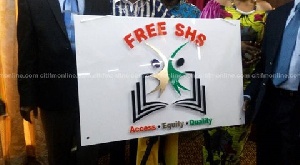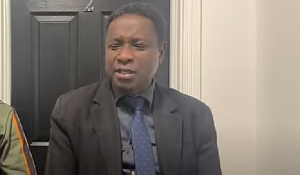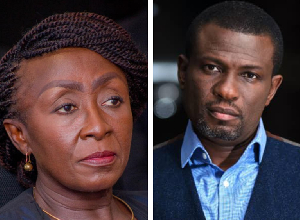According to the 1992 constitution, there must be Free, Compulsory Basic Education (FCUBE) and progressively free secondary education for obvious reasons.
To realize this constitutional provision for affordable and accessible secondary education for all Ghanaians, former President John Dramani Mahama launched progressively free secondary school education in 2015, considering the inadequate infrastructure and financial resources of our country.
Former President Mahama, together with the former education minister and now the
running mate of the NDC, Prof. Naana Jane Opoku-Agyemang, rolled out the construction of E-Blocks to prepare for adequate space and facilities to accommodate more secondary school students in all the regions of the country. The physical presence of Mahama’s E-blocks in the country speaks for itself.
The current President, Akufo-Addo, and the NPP made an undiluted electoral promise to Ghanaians in 2016 that they would implement free senior high school (fSHS) wholesale, but not Mahama’s progressively free approach when voted into power in 2017. Lo and behold, FSHS was rolled out without a proper implementation plan.
The NDC and other well-meaning Ghanaians pointed out some red flags of the FSHS policy, such as the lack of sustainable source funding, need-based assessment, and proper and methodical implementation plan put forward by the NPP. Akufo-Addo was put on the spot during the global BBC ‘Hard Talk’ program by Stephen Sarka regarding how President Akufo-Addo and the NPP were going to fund their flagship and too-ambitious social policy, FSHS.
The President declined to answer the host but said he would answer the Ghanaian people's burdens but never did after winning power in the 2016 general elections. It is not surprising to me to see that this good SHS social policy for developing our human capital was shambolically implemented and created avoidable problems and more burden for students and parents.
The populist approach of the NPP to use FSHS to deceive Ghanaians to vote for them twice has been badly exposed, and it will not work this time around!
Any social or scientific policy or project running for at least 3 years can be reviewed for improvement. Thus, the call by former President Mahama for a review of the FSHS due to avoidable teething bottlenecks was appropriate. Now the call for review of the FSHS has become louder from various sections of our society to make it better and more sustainable.
Shockingly, the NPP dishonestly took the genuine call for review of the fSHS policy by President Mahama to mean ‘cancellation’ of the policy by the next NDC/Mahama government. To review this fSHS or any other policy or program does not, by any imagination, equate to cancellation!
The NPP is clearly taking meek Ghanaians for granted and still wants to fool the electorate with the same propaganda that the former President and Flagbearer of the NDC will cancel FSHS in 2025 when he wins the Presidential election in 2024. There is even an attempt by the NPP to make Ghanaians believe that the NDC Minority caucus wants to block the proposed FSHS bill (yet to be brought to Parliament), which seeks to make FSHS policy compulsory for subsequent governments. This is a palpable untruth and sheer dishonesty on the part of the
NPP to deceive Voters with the ‘cancellation’ idea again.
Ghanaians, let us rather be weary of this hypocritical NPP government, which abandoned the 40-year development plan, uncompleted Mahama’s E-Blocks, Cocoa roads, and Saglemi Housing projects to rot and now turn around to say that fSHS policy will be cancelled when the next NDC/Mahama government is not yet in place.
It is the collective responsibility of all of us to exercise our franchise and vote out this disappointing Akufo-Addo-Bawumia-led regime in the upcoming general elections. Let us build a better Ghana together with the next NDC/Mahama government.
Opinions of Wednesday, 17 July 2024
Columnist: Dr. John-Baptist Naah



















